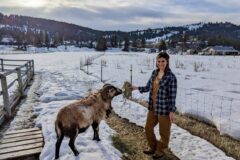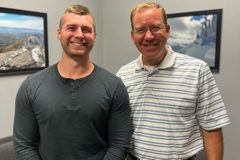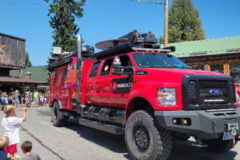Giuseppe Caltabiano- Circumnavigating the world, global success in Montana!
In this episode of Making it Work in Montana, we interview Giuseppe Caltabiano. Giuseppe has succeeded in growing a global company in Montana! He flies his own planes, operating globally from an amazing headquarters in Whitefish, MT. He’s even an actor now. A very interesting individual!
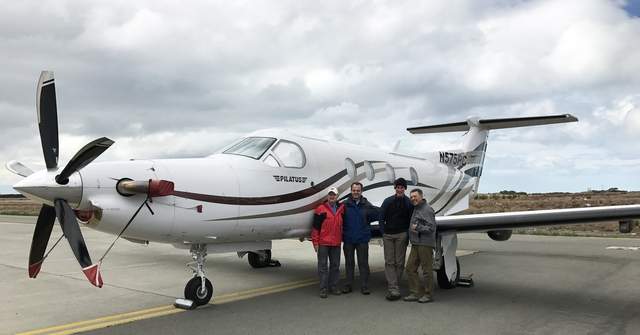
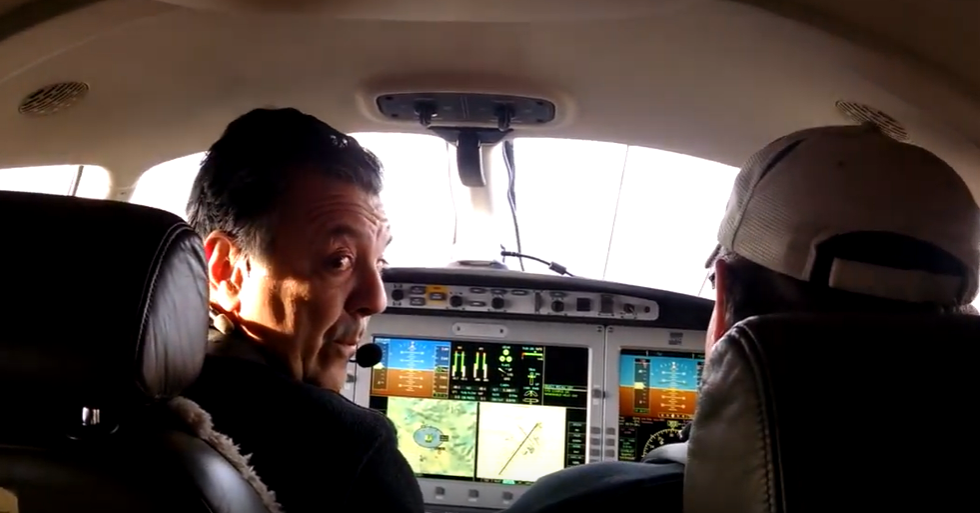 (photo credits: whitefish pilot, Giuseppe Caltabiano YouTube )
(photo credits: whitefish pilot, Giuseppe Caltabiano YouTube )
Check out Giuseppe on LinkedIn here ![]()
And read more about Giuseppe’s pole to pole flight adventure on the Bank of Montana Blog here https://bankofmontana.com/giuseppe-caltabiano/
****************************************************************************************************************************************************************************
Welcome back to Making It Work in Montana. I’m David Boye, your host. As we’ve stated before, I own Black Diamond Mortgage and I’ve been living in Montana since
nineteen ninety six. Making it work in Montana is an opportunity for me to share with you and other listeners about all the amazing people that I’ve been able to meet
that have made a life for themself in Montana. Today, I’ve got a good friend of mine that I’ve known for about a decade. And a lot of cool things that we can talk about, it’s
actually tough to narrow it down to just the scope of this show. But our guest today is a dual citizen.
[00:00:45] He flies airplanes. He has actually recently was contracted with a buddy to go get a plane to Alaska and fly it down here because he’s into that kind of thing. He recently,
in the last few years completed a basically it was like a world record type situation.
[00:01:05]
Something that hadn’t been done before is precisely pole to pole circumnavigation in an airplane with some friends of his.
[00:01:13] He’s also run successfully a multinational payment processing company that’s based in Whitefish, Montana. That’s global in scale. He’s raised two children, is married and
consistently spent his life actually working on a global scale. And my guest today is Giuseppe Caltabiano.
[00:01:34] Hello, Dave. Hello, everybody out there. Did I pronounce your name right? Close enough to close in on each other along? Exactly.
[00:01:43]
So I wanted to hit on a couple of things. First of all, just give us a brief overview of how where you grew up, where you got started and how you made it to Montana.
[00:01:54]
Absolutely. That will take 10 hours. So I was born in the Italy and my family is from the south from Sicily. So some people say I’m not Italian. Im Sicilian. Grew up in the
Italy, graduated. I have a doctoral degree in electronics computer science out of Milan. Then I went in the Navy. I’m a Navy officer from the Italian Navy where I
understand the food and the wine better than the American Navy. So that’s a good place to be. A military guy went in business right after the Navy. And at 31 years of
age, I joined a company called VeriFone, which moved me to London, U.K. to manage an area of business called Europe, Middle East and Africa. And that’s when my travel
started, my traveling life started. After that, they promoted me to run similarly to what I did in Europe, a different area. They called it Asia Pacific, which means anything
from India to Guam and the east to west, from New Zealand to northern China, south to north. I based myself in Singapore and I lived there for a few years. That point I met my wife, an American citizen, Jamie, and we started our family out there. After Singapore. We moved to Australia in Melbourne. There we had our second child, Ian
and fast-forwarding. We moved to Italy for a few years and then to US in Oregon first. And in 2005 I discovered Whitefish, Montana, and I joined forces with the WHO was
at that time the initial the initial founder of nxgen, a transaction company. And my partner and friend and I say older brother Tom Nitopi, who had started the company
here in Whitefish three years earlier and working with him and falling in love with Whitefish. Every time I came here for business meetings, I decided that that was going
to be the next place to live.
[00:04:05]
Great. That was rapid speed for what all took place, right? Right.
[00:04:10]
So before Nxgen, was the industry similar? Was it financial services or was it different?
[00:04:18]
I’ve always worked in electronic payments always since my thesis. My doctoral thesis was the first system in Italy in 86 to allow cardholders of ATM and cards to pay at
the stores using their card instead of going first to ATM. And get the money out and then shop at the stores. So all my life has been in that sector.
[00:04:43]
So what Nxgen currently excels? That is something that you were involved with, whether with Nxgen or not, that technology way back when it was just becoming
available.
[00:04:54]
That is correct.
[00:04:55]
That is very interesting. And then you said you met your wife in Singapore.
[00:05:00] well no. I met her while I was living in Singapore. She worked for the same company at headquarters, which was in Palo Alto in near San Francisco. And during a business
trip, I would come back to us one week every five. So imagine living in Singapore and coming to U.S. one week, every five to meet with my management in San Francisco
and I met Jamie, actually not at the office, because I was warned by the attorneys not to ever find myself in any potentially compromising situation with anybody in the
office. Being from outside of the US, we did not understand the problems in the state, the sexual harassment issues here in the US as well as they did here. And so I met
her outside at an conference and I didn’t know she worked for Verifone until she teased me, saying that she saw me every every month and I always avoided to say hi to
her.
[00:06:02]
Cool. I didn’t. I’ve known you a long time and I just didn’t know that. A little bit of information. Now part of your story or part of what I wanted to talk about a little bit is
flying planes because it’s something that I’ve known you to be passionate about. So when did flying planes become part of your life.
[00:06:19]
I sat inside the first plane I ever piloted forty two years ago. before that. At that time I was a teenager. Before that, I always flown at remote control air models. So I’ve
always loved flying. I believe in. I don’t have hard statistics, but I would say 90 percent of pilots have a passion for it, if not more. So I’ve always loved flying. But my mother, who was concerned about safety, made me promise that I would never fly as a job because she knew that I would want to be a military pilot or work for the
airlines. And so I was lucky enough to find a way to fly at general aviation, although now I have a commercial license and never become an airline pilot nor and military
pilot.
[00:07:15]
And then recently you you went on a major flying expedition.
[00:07:22]
Tell us a little bit about what that was, the pole to pole circumnavigation like even when I’ve heard about it.
[00:07:27]
It requires just a little bit of explanation of what it is and why it was significant?
[00:07:32]
They called people who fly aeroplanes around the world, air rounders. And in 2015, a close friend of mine, we’ve known each other through being on a number of national
safety boards in aviation, analyzing accidents and giving and helping new pilots to prevent accidents. Jack owns the largest pc12, which for the local people, it’s this same
aeroplane that alert flies, not the helicopter, the airplane. It’s a single engine turbo prop, which is a jet with a prop in front of it, a very spacious inside, very capable . Jack
invited my wife and myself and another pilot and his wife to go for a round the world trip. This is a norm around the world, along the equator, east to west. And this is
sure. So we flew for almost two months together, and that we enjoyed it. The wives enjoyed it. And we came home and I thought we were done. But a few weeks later,
Jack calls me on the phone and says, You realize that was a test? I said, Test for what? To see how we work together will work.
[00:08:46] What’s the plan? He goes well. My bucket list item was not this flight. This was fun, but it’s a real mission. Nobody has ever flown a stock aeroplane, meaning no
additional fuel tanks, no modifications around the world, but not horizontally. Meaning from west to east or east or west, but going north and south, so going all the way
up, go over the North Pole and all the way down on the other side under the South Pole and back up.
[00:09:17]
And I said, Jack, is it even possible? It goes, I don’t know. That’s why we need to travel to this side. And indeed, we split roles just because I spoke Spanish. I got the
hardest part, which was Antarctica from Chile.
[00:09:32]
And it took us one year of planning. And it was beautiful because we are business people, project managers. We did it like a real project and we accomplished it. So in
January twenty seventeen, we completed the trip.
[00:09:50]
So this is basically a lot of logistical planning that has to be perfect in order to complete it because of all the different countries. Exactly and where things have to be
located along the way, the fuel, fuel in Antarctica.
[00:10:05]
That was a major challenge. Our insurance needed to state that should we crash They would come and pick up all the pieces to make the ice cap clean. We had to have
spear gear on the plane because if you land in Antarctica and you have a flat tire, you block untidy back for that area because you’re sitting on the runway. So and the
paperwork was pretty thick to.
[00:10:30] Well, and so clearly, you know your thing. You know your way around flying airplanes and your company that you work there.
[00:10:38]
Actually, I know for a while you guys used that skill in your company. Can you explain a little bit about.
[00:10:46]
Yeah, that is an aspect of you because you own a business in Montana and you have pilots like I’m a partner in the business.
[00:10:54]
I wish I owned it.
[00:10:55] Well, I thought that said, just before we move on, I just wanted to make a little a point because I want to recognize another institution that is the Museum of the Rockies, where they have a DC 3 called Miss Montana. And that said, DC 3, the military version was a cargo plane called C-47. And I just wanted to give them the merrit because my next the most important enterprise was thanks to them. They invited me to fly this plane at the seventy fifth time they were sorry on D-Day last June 6. And it’s very
dear to my heart to have flown the plane as a jump seater from England to Normandy on June 6, the launching jumpers out there on the beaches. And then later, as a copilot from Normandy to these by then was an amazing experience. So I just wanted to put this out there, too.
[00:11:54] Now, it’s a matter of fact, I had seen a picture of you on that plane on like Facebook, and I actually didn’t know what you were doing.
[00:12:01]
And so as it is with you, you’re probably doing something pretty amazing when you’re you’re not just wasting time.
[00:12:09] Well, when when you’re when I see Giuseppe out about he’s got something going on right. Not as amazing as David as well.
[00:12:18]
So. So time. So the the pilot thing played a part in in running a business in Montana. Explain that. Yes.
[00:12:26] When we moved to Montana, the connections are out of whitefish through the airport. Glacier Park International, we’re even less capable of what we have today. So really,
for me, you could go to Salt Lake, Denver or Seattle and to do business. National wide, if not internationally. Sometimes it was a little challenging. So I combined the gift I was given to be able to fly plane airplanes with the capability of the company to acquire at the beginning a small single engine piston aeroplane, a beautiful series, Assad
22 for people who do not know planes as that plane with a parachute in case of emergency. And that gave us legs to go to places like Boise, Idaho, Calgary, Canada. We
had an office in Rapid City, South Dakota. All places. That car will take 14 hours to go to more or less. And with a plane, the was a couple of hours. So we started adopting
the time and money saving power of having a little aeroplane. And then as we grew and we need to move faster, we first acquired a small jet that we kept all for
ourselves. And now we are working in that partnerships and at times sharing that or other types of aeroplanes.
[00:13:50]
And based on that experience, is it primarily more efficient to use the private plane model or even the leasing combination, or is it just preference because you get to fly if
people wanted to run global companies in Montana?
[00:14:06]
I would say yes to Both. Yes, I would be honest. First of all, with me flying the plane makes things faster and easier. But sometimes we have a pilot because sometimes I
have no part of that particular meeting. So there is no reason for me to be the driver or when we have a number of meetings that one after the other in multiple places. I
prefer to fly the first leg of the day when I’m fresh and rested and the pilot to fly after the meetings and the legs and leave. And because I have the meetings and I am not
I’ve not focused on flight planning the plane. So safety is always the first concern. And if I don’t feel like flying the plane unless I have another pilot when I get fly the
plane.
[00:14:54] Well, so it sounds like it’s it’s fun and it can benefit the company. Absolutely. Absolutely.
[00:15:01]
So so getting into running a global company out of Montana.
[00:15:05]
One thing I’ve noticed just in my business as a mortgage broker. It’s easier than it’s ever been for people moving here to declare Montana as their primary residence
because the way it works.
[00:15:19]
Companies can work globally just as a general principle. And you can really call anywhere you want home.
[00:15:24]
But I’m sure there’s good and bad with that. So you’ve been working for a company like you say, your partner in it, that you’re about more than 10 years, I guess, now out
of Whitefish. What are the best parts of it? And then maybe just address that first and then we’ll talk about some of the other things.
[00:15:43]
First of all, living in Montana, it’s a unique lifestyle. So my children, my wife and I embrace the lifestyle. It’s mostly outdoorsy and lifestyle. Lifestyle. If you’re into
gardening and growing vegetables, it’s a little bit more challenging. Why leave people like to go hunting and eat what they kill? It’s more indicate to be here in Montana.
So there is a lifestyle concept that we happen to have embraced and we love it. The schools were medium to good. We’ve always half homeschooled our children because we wanted them to grow, understanding both the decimal system and the imperial system, being bi cultural, so to speak. So we we’ve done well. We’re thankful about the
education system and the lifestyle. There are challenges too, where some needs that are fulfilled better in their largest city. So I would say cultural that although here we
had two theater companies that sometimes, you know, you can do things in a city that are harder to do here in Montana. And on the other hand, though, the lack of
traffic, which unfortunately seems to be changing now for the worse, but mostly I couldn’t even stop working and Noon had a bite at home, had lunch and my wife, if I want, and go back to work. Get one in a city, this would be unthinkable. So the convenience of living in a small town with a ski resort attached to us and two national
parks. If not three with Waterton all around us. It’s a dream come true.
[00:17:28]
So, yeah, yeah, I’ve noticed the definitely the quality of life is why most people want to be here with the traffic, though.
[00:17:36]
I think all you have to do is go to a place like L.A. to do its business. The car, when you’re like you don’t what? There is no traffic in Montana.
[00:17:43]
I was just I was just in Chicago for a board meeting.
[00:17:47]
And by the way, that’s where the plane was key because we flew five people to and back by and we saved two nights at our test by doing that. And I had a back to back meeting in whitefish that I couldn’t have accomplished without a private flying. But that’s an example. We went to Chicago in the and I landed not in the big airport, O’Hare. I landed in the executive airport near to where we had the meeting. Otherwise, the traffic would have been two hours commute. Correct.
[00:18:17]
So so when you guys are hiring an employee right now, the company is basically corporately located in Whitefish.
[00:18:25]
It has people all over the place.
[00:18:27]
If somebody is applying for a job or does it make any difference to you guys if they live in Whitefish anymore?
[00:18:34]
It depends. So first of all, after a number of mergers this year, we in the USA have three headquarters. Now we have one in Whitefish, one in Chicago and one in Atlanta. Now, if the person is a customer facing person face to face, the person needs to be wherever the market we’re hiring for is. Otherwise, we use the concept. We say
virtually where are you virtually based? And that people could be based anywhere. There is a high speed Internet connection. We’re always communicating via video
communications and that my example, I only have one employee in my team that works in whitefish. All my team is spread around the world and I have employees in Mexico City. I have staff in Manchester, UK, in Calgary, in Toronto. So even if I wanted them to work in the flesh with me, it wouldn’t make any sense.
[00:19:34]
And I could go if you call a meeting. You’re basically just firing up your Internet connection and everybody’s on the beat.
[00:19:41]
And we’re actually use a professional system that’s called zoom. But anyone would work today. And the only concern is managing time zones.
[00:19:52]
So that’s that’s encouraging for people that want to live in Montana. Alex, when you guys are doing at this company .
[00:20:01]
Is there anything that you would want to like? You’ve you’ve been able to do this for ten years. If you go back and draw a straight line to where you are right now, running
a business out of Montana. That’s global in scope.
[00:20:13]
Is there anything you would have done a little bit more efficiently or differently that somebody was thinking about getting started or just listening to this would learn from
that you guys could have done and or words of advice?
[00:20:25] We we have been a little bit of an icebreaker. Like the ship that breaks the ice. And we love to be that way. That that’s the reason of the name of the initial company Nxgen. As always, thinking, the next generation of technology, of culture, of how to do business. So I have a hard time imagining a different way or pioneering something.
But I do believe that there is room here for improvement to where I think the community has not yet managed to implement what I call the incubator culture. I think that
here in Whitefish here or in northwest Montana, we have some key ingredients for blossoming of new businesses. We have the brainpower because the schools in the Northwest are amazing. They’re very good from Flathead Valley Community College to Gonzaga to Bozeman to Missoula, to universities in Seattle and Washington and
Oregon. So we have the brainpower and in students who come up in the northwest normally love the northwest and they love would love to be here. So we have the
brainpower. We have the money. And the money moves. The money crosses borders. Don, my partner gave a TED X talk where it explained that the second country in the world for startups is Estonia, of all places.
[00:21:53]
After U.S. Estonia, which is where Skype was born as an example, and Skype was sold for two billion dollars out of Estonia. So money moves. We have money here and we
can attract money. Lifestyle. We have lifestyle. So what’s missing are the key ingredients of making startups blossom in this area. Is Krabi a way to facilitate this new
companies to where, you know, you you remember the stories. Amazon was born in a garage. Google was born in a garage. But they don’t stay in the garage too long.
They moving to maybe some empty space in Stanford University, where they can work for free and can use computer space and they have support. So if we could figure
out a way and we played with the idea, at nxgen, we actually have an area that’s got incubation area, but we are open to other businesses. And if we could think as a
community leaders of ways to host startups in a space incubator, like maybe that’s the next step for us.
[00:23:01] Have you seen that in another part of the country where you were thinking it would be great to have it in Montana? Or is it more just a concept in general that
everybody’s going after ?
[00:23:12]
Or what was it done really?
[00:23:14] Well, and in the Silicon Valley, Silicon Valley saw both those three items that I listed that Tom put together years ago are three out of the four items that you see in the
Silicon Valley. The fourth is the incubation space.
[00:23:28]
And then when you guys were running the company. Tell us a little bit about, I guess just Nxgen where it’s out right now, where you’re at with it, just to give people a
vision of what this company is in case they don’t know.
[00:23:41]
Ok. I live in Whitefish. We kind of have some familiarity with it.
[00:23:44]
So so what we do, I call ourselves a system integrator of solutions for payments at a business. So if I’m a new shop in town and I sell fashion items and I also sell them
online and I need to start accepting a visa card, I do not call Visa on the phone and say, hey, I want to start accepting your credit card, because then I would have to call MasterCard and American Express on so on. Normally I would go to my bank and ask, how do I do this? Well, we are a neutral company. We provide a complete solution
that allows businesses to accept payments and manage their inventories, both face to face and online. And by putting together all the components and the raw material
are things like a P.O.S. system, things like a pinpad that accepts your card. Now Apple Pay. Now people don’t even swipe or dip the card anymore. They carry their phones
and play with their phones and all the software needed to run those things. All the security components you heard, you hear things like PCI and various security items and
all the transactional side of it. So like magic, it still impresses me. I still have a bank account out of a bank in Milan like magic. I can pull out my card attached to that bank
account, buy an ice cream here in town and my money gets moved from my bank account in Milan to the bank account of the shop in Montana. Like like magic. So to me,
it still impresses me and were part of this big, big transactional World. Nxgen was born and grew up to having around 15000 customers worldwide. Up until December last
year. And then we were targeted by a very good private equity firm, growth oriented.
[00:25:45]
These are people who invest other people’s money in places that they hope will grow their money.
[00:25:51]
And we put a plan together. They invested in us. And using that money and the power given by growing more quickly in the last seven months were merged and they
acquired a number of companies. So the nxgen that had 15000 customers in December now is changing name.
[00:26:10] Name is going to be called pay rock. As a very stable player in the payment industry, we have almost 60000 customers. We process 30 billion dollars a year and we’re
very excited to move forward.
[00:26:25]
So tell me if I simplified this correctly, but it’s there’s a relatively complex system of moving all that money around.
[00:26:33]
And your company makes it easy for somebody to have the ability to do that. We like to say frictionless. Yes. So we are similar in the mortgage industry. We it’s very
complicated, but we want the consumer to think it’s very simple. If they just go through somebody that knows what they’re doing. Absolutely right.
[00:26:51]
And then it’s that type of thing.
[00:26:53]
Is that this kind of ongoing like is it always going to be complicated? Therefore, you’re always going to need something like what you guys are doing?
[00:27:01]
I feel that way. Like, I’ll just say on the mortgage side, we always sit around where will we eventually not be necessary? But then the complexity is always there. We’re
like we can’t actually imagine not being necessary.
[00:27:12]
Yes, I agree. And it is more than the complexity. It’s the complexity, but it’s the number of players on it. So to to integrate all this number of players in a seamless way to
the user, in the end, I think you need a neutral player. And this neutral player, if that player can add value, will have a reason to be.
[00:27:38]
And then tying it back to Montana because of technology and because of this being a relatively intellectual concept, you can be in Montana because you guys could be
anywhere.
[00:27:49]
That is correct. That’s great. It’s great that you guys have decided to be in Montana. We’re very thankful for that.
[00:27:54] Well, we could go on about so many things that you’ve done. One thing I wanted to hit on, because when you mentioned it at the right before we went on the air, you’ve
recently been an actor and you tell people real quick.
[00:28:07] What did you act in? Was the way there was a beautiful play.
[00:28:11]
It’s called Over the River and Through the Woods. It’s a story of two couples, of grandparents, of Italian origin. And they live in Hoboken, New Jersey. They have a
grandson left nearby who gets an opportunity from this Company to had a promotion and moved to Seattle. Now this grandparents who live in Hoboken, New Jersey, look
at Seattle like if it’s Mars and they tried to figure out a way to keep the grandson close to home. It’s a beautiful story. I did it as a challenge to myself. I think I’m a very
logical, rational individual. People say right brain kind of person. And being an actor was completely outside of my comfort zone. I could cheat myself and say, I’ll push myself flying a different type of playing, but it’s still flying planes. Acting was amazing in that. And I was blessed. I had a great director, David acroid, who taught me a lot
and cast a lot of five actors. They were professional actors who taught me a lot. So I was very thankful for that experience.
[00:29:19] Well, your recommendation. I watched it with my daughter. We had a good time and having a italian in america. You seemed perfectly suited for the job.
[00:29:32]
If anybody wants to try acting, what do you have to say about whether they should ? What should they expect?
[00:29:39]
I think a few have never acted. It’s a very new experience, but it helps you discover yourself even. And that our community is blessed with two beautiful theater
companies. And they’re all they’re both very, very good. So I just read that on the local paper there was an ad that to audition and they just went and audition. So I would
invite and and challenge everybody to go and try to audition themselves well Giuseppe.
[00:30:08]
So great to have you here and your experiences speak volumes as long as I’ve known you. You’re the kind of person where if I ever reach out to you for advice or to ask
the question, you’d respond back. So if anybody heard something on this and they reach out, perhaps they can get a this, you’re going to respond back and link them
through you.
[00:30:26]
Yeah.
[00:30:27]
Yeah. Linked in Giuseppe’s on LinkedIn.
[00:30:29]
And you Google him in Whitefish and you’ll find them.
[00:30:32]
So just thank you for taking a moment out of your busy life to share with people what I think is a fantastic example of somebody making it work in Montana because you
guys picked this place because you wanted to live here and then you made it work for your company to exist here.
[00:30:49]
And you’ve done a great job, obviously, as proven by that recent changes in your company that you describe.
[00:30:56]
So thank you very much. And thanks for joining us.
[00:30:59]
And as I’ve mentioned in all the previous podcasts, we would like your feedback. So if you have feedback, put it on the Facebook page. Let me know what you think.
[00:31:09]
If you have somebody that you think could be a fantastic example of making it work in Montana through their experiences in the outdoors or business or the community,
let me know. We want to make this a program that you, the listener, enjoy. So thanks for joining us.


